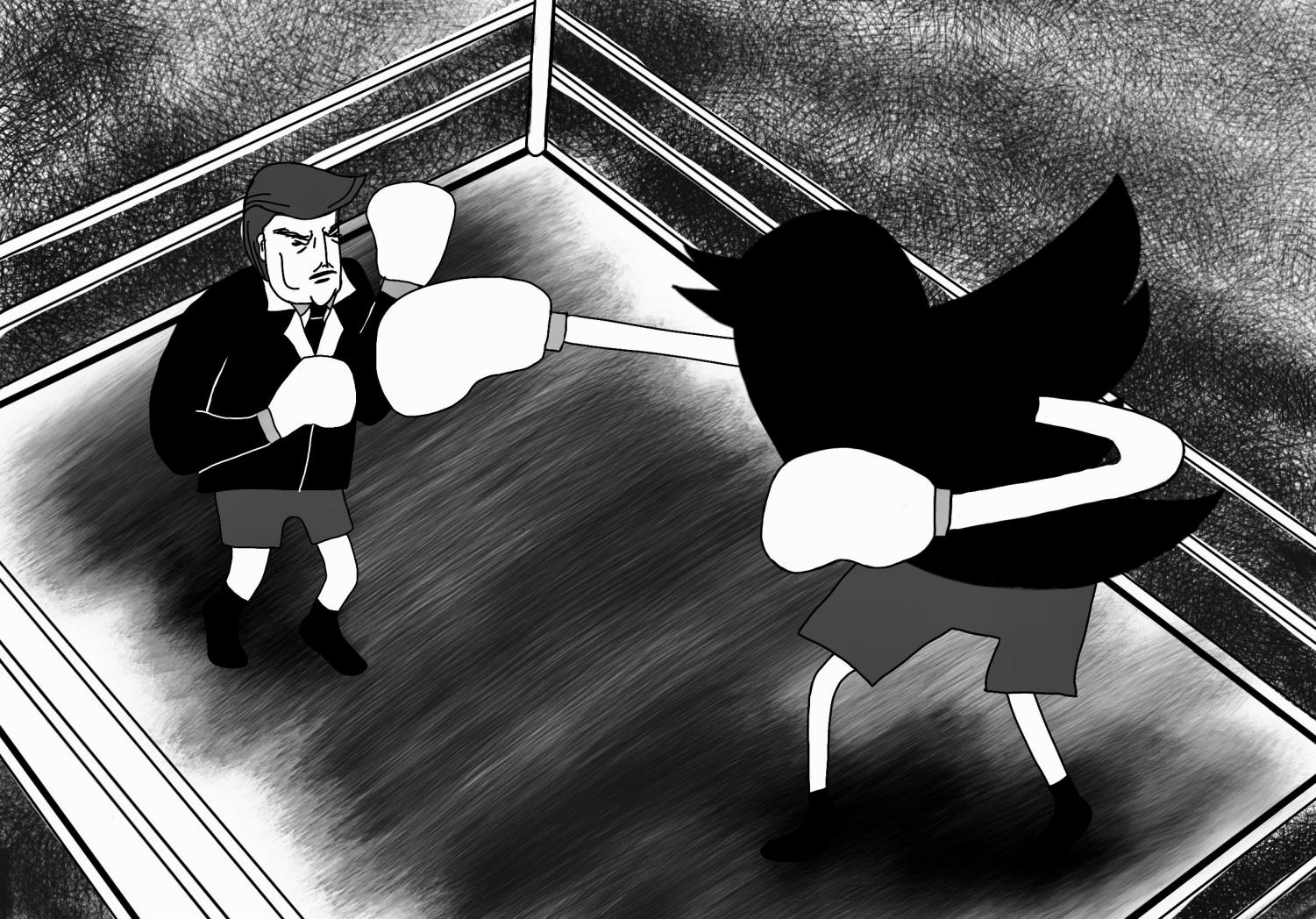Two Views: Was Trump’s Twitter ban the right call?
February 5, 2021
Yes: Trump inspired domestic terrorism; he must be silenced
Donald Trump has a history of dodging the law, whether it be by not releasing his tax returns, obstructing his own impeachment investigation, or failing to be held accountable for pressuring Georgia’s Secretary of State to change the Presidential vote count. But, for the most part, he has faced little, if any, punishment for his wrongdoings. He has been above the law for his entire life.
That’s why his permanent suspension from Twitter came as a shock. If he were treated like any other Twitter user, Trump would have been banned years ago; he repeatedly broke the Twitter general guidelines and policies long before the Capitol riots.
In the COVID-19 section of the guidelines, Twitter adamantly disallows any type of COVID-19 related misinformation. After Trump received the best possible treatment that any American could expect, he sent out this tweet.
I will be leaving the great Walter Reed Medical Center today at 6:30 P.M. Feeling really good! Don’t be afraid of Covid. Don’t let it dominate your life. We have developed, under the Trump Administration, some really great drugs & knowledge. I feel better than I did 20 years ago!
Trump didn’t get banned for his Republican ideas; he didn’t get banned for wanting to lower taxes, protect the second amendment or restrict abortion. He got banned for lying to the Americans and inciting a deadly rebellion against the government of his own people. — M. Brody Leo
The President sent out a tweet that told the American people to not fear or plan their lives around a deadly virus just around the time that the United States confirmed 200,000 virus-related deaths. Since then, that number has doubled. His understatement of the virus was dangerous and in direct violation of Twitter’s guidelines.
Regardless of the past, I’m glad that Trump couldn’t do more damage after the Capitol riots were viewed as the tipping point. The riots were not an isolated incident; they followed months of Trump’s insistence, which he often voiced through his Twitter account,that the election was rigged. For some supporters of the President, that was a direct call to arms; after all, their very own President had told them that they were robbed of their fair democracy. Trump created anger and divide over Twitter. Jan. 6 was a direct result of that rhetoric.
After the riots, Trump tweeted out a video of himself addressing the situation, where he lovingly called domestic terrorists “very special.” In that tweet, he was romanticizing violence quite literally, as he did tell the rioters that he loved them. If the harm of his actions isn’t enough, inciting violence is also directly against Twitter’s guidelines.
This isn’t a mark of an “Orwellian” future of suppressing opinions online either, as Senator Hawley suggested in a tweet about the cancellation of his publishing contract with Simon and Schuster. Trump didn’t get banned for his Republican ideas; he didn’t get banned for wanting to lower taxes, protect the second amendment or restrict abortion. He got banned for lying to the Americans and inciting a deadly rebellion against the government of his own people.
Trump’s removal from the platform is not a violation of our Constitutional rights either. The first amendment preserves our right to free speech, unsuppressed by the government. It does not protect us from being banned from a completely private platform, or from facing consequences for inciting violence against the United States government. Twitter was completely in the right for letting their platform be used for violence.
Words matter. That’s become a cliché today, but Trump has taught us that. Social media is more important than it has ever been, and it’s a source of news for over half of Americans, according to a Pew Research Center study. We simply cannot afford for the most powerful man in the world to have a filterless outlet to nearly one hundred million followers if this is what he has done with it.Pr
No: Twitter censorship infringes upon free speech
The shutdown of Trump’s Twitter account on Jan. 8 reignited the debate regarding whether or not censorship by big tech companies has gotten out of hand. There is no doubt that Trump’s continuous message that the election was rigged against him incited the riot at the Capitol on Jan. 6. However, banning Trump from Twitter is a step too far.
Many Americans, especially Republicans, have long complained about censorship from major tech companies, including Twitter, Facebook, and Google. These companies act as platforms for conversation, garnering billions of users. So, they should preserve freedom of speech, even if what is posted advocates a belief contrary to their own. This responsibility protects social media companies from libel laws, which publishers, like news outlets, are not protected from. No one hopes for another violent incident like what happened at the Capitol, but does that mean, in the future, companies like Twitter have the power to decide which tweets should and shouldn’t be censored?
Throughout his presidency, Trump was incredibly vocal on all social media platforms, and at times, unpresidential. Twitter’s permanent ban of Trump’s account, despite his more than 88 million followers, came after he released a video asking the rioters to “go home.” Along with the ban, Twitter issued a statement saying: “We have permanently suspended the account due to the risk of further incitement of violence.”
As a private corporation, Twitter retains the right to do anything they desire with their service. However, the notion that a corporation as large and influential as Twitter can dictate which opinions can and can’t be heard is a terrifying reality.
The silencing of the nation’s president on Twitter was not an isolated incident – other social media companies also banned Trump and the social media platform Parler, which was founded with the aim to provide a nonpartisan public square, was removed from Amazon Web Service, Apple’s App Store, and Google Play Store. Parler has a user base of mostly conservatives––one of the reasons it was created was to be a safe space for conservatives as other platforms like Twitter and Facebook censored conservative voices. The removal was rooted in a claim that several comments from Parler users that incited the violence at the Capitol weren’t dealt quickly enough. Executives at Parler believed that the app was targeted because of its largely conservative user base.
The notion that a corporation as large and influential as Twitter can dictate which opinions can and can’t be heard is a terrifying reality. — George Chang
While it is mostly conservatives that are complaining about censorship at the moment, it does not mean that members on the other side of the aisle are safe from this threat because social media companies hold tremendous control over our everyday speech.
Though you don’t have to agree with the viewpoint of many conservatives, the thought that companies with such large-scale influence, being able to remove and silence thoughts they disagree with, is unsettling. Perhaps the problem isn’t who Twitter and Facebook ban, but how much power the big social media companies have over the news and opinions that we see.

Working in Tower to improve his photography skills, Junior George Chang has attended the Masters School for three years. His journalism journey began...

